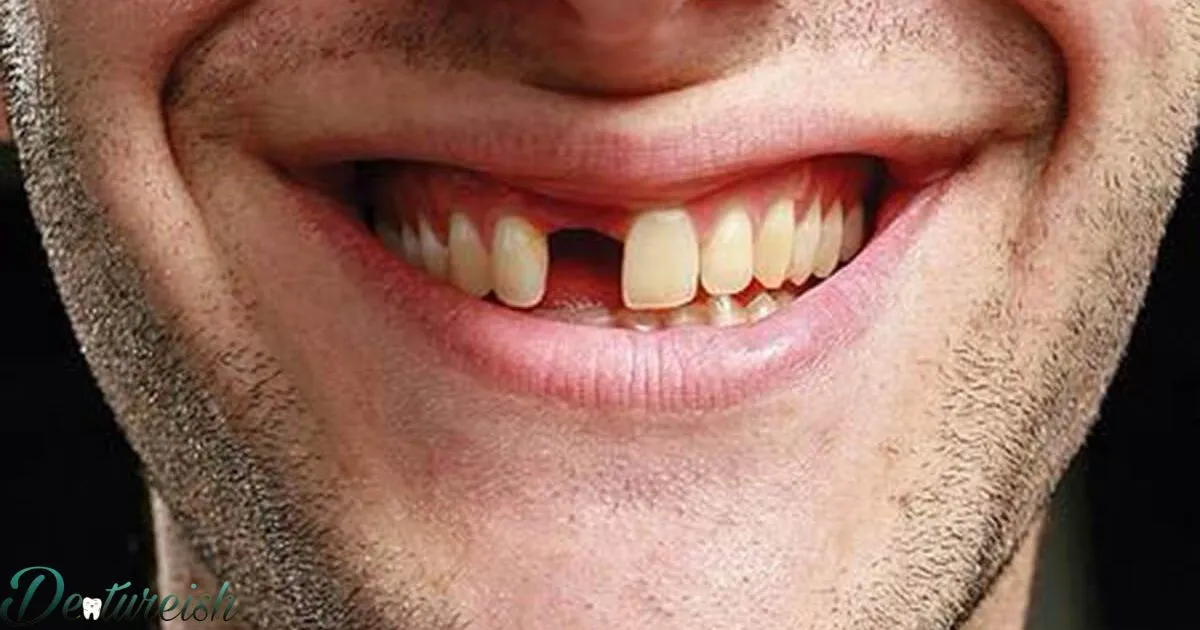A single fake tooth is a dental prosthetic designed to replace a missing or damaged tooth. It is created to blend in with your natural teeth. A single fake tooth can be made from various materials like porcelain, ceramic, or metal alloys.
Can You Get A Single Fake Tooth? Many people wonder if it’s possible to get just one fake tooth if they have a single tooth that is damaged or missing. The answer is yes, you can get a single dental implant or dental crown to restore the look and function of a single tooth without having to replace multiple teeth.
Getting a single fake tooth is an excellent solution for anyone missing one tooth due to an accident, infection, or congenital condition. A single dental implant or crown can be custom created to precisely match the color, shape and size of your natural surrounding teeth. The prosthetic tooth is securely attached to prevent slipping and allows you to eat, smile and speak with confidence again.
Can You Get A Single Fake Tooth? An Introduction
Yes, it is possible to get a single fake tooth, known as a dental implant, to replace a missing or damaged tooth. Dental implants are artificial tooth roots made of titanium that are surgically placed into the jawbone where the missing tooth root once was. An artificial tooth is then attached to the implant post that extends above the gumline. Getting a single dental implant can restore both the look and function of a lost tooth.
What is a Single Fake Tooth?
A single fake tooth refers to a dental implant designed to replace one natural tooth that is missing or must be extracted. The implant consists of three parts – the titanium implant post that integrates with the jawbone, the abutment that connects to the implant, and the artificial tooth crown that is attached to the abutment.
The materials used, like porcelain fused to metal, are made to closely match the color and shape of natural teeth. Once the implant, abutment, and crown are in place, the single fake tooth mimics the look and function of a real tooth.
Why Would You Need a Single Fake Tooth?
There are several reasons why someone may need to get a single fake tooth dental implant, including:
- Losing a tooth to decay that is too severe to support a filling or crown
- A tooth that fails root canal treatment and has to be extracted
- A missing tooth due to trauma or congenital defect
- Tooth loss from advanced periodontal disease
- Removing a tooth to make space for orthodontic treatment
- Filling in a gap from a genetic absence of a tooth
Replacing a single missing tooth prevents surrounding teeth from shifting, helps restore chewing function, and gives an improved cosmetic appearance.
How Does a Single Fake Tooth Work?
A single fake tooth dental implant works by surgically embedding a small titanium screw into the jawbone, which serves as the artificial tooth root. Removable Partial Denture For One Tooth after the jawbone grows around it in a process called osseointegration, the implant can support an abutment and custom-made tooth crown.
The crown is attached to the abutment post, which connects to the implant. This creates a secure new base for a replacement tooth that looks, feels, and functions like a natural tooth. Dental cement is used to fill any small gaps between the implant abutment and crown. Over time, the bone bonds with the titanium implant post, anchoring the single fake tooth in place.
The Process of Getting a Single Fake Tooth
Getting a single fake tooth typically involves a dental implant procedure, which is a multi-step process. Initially, a patient undergoes a consultation to assess the suitability for an implant. If deemed appropriate, the first surgery involves placing a titanium post into the jawbone, which acts as the new tooth’s root.
This is done with precision, often using 3D computerized planning to ensure accurate placement. After the post is inserted, a healing cap may be placed over it to protect it while the jawbone integrates with the implant, a process that can take several months.
Once the implant has bonded with the jawbone, an abutment is attached to the post, and finally, a custom-made crown that resembles a natural tooth is placed on top of the abutment.
What to Expect When Getting a Single Fake Tooth?
When getting a single fake tooth, patients can expect to undergo a procedure that is performed under local anesthesia to numb the area, ensuring no pain is felt during the implantation. Some pressure might be experienced, but it should not cause discomfort.
After the procedure, while the anesthesia wears off, some pain is common but can be managed with over-the-counter pain relievers like ibuprofen. The healing process involves avoiding hard foods and using ice packs to reduce swelling. Patients are usually able to return to their daily activities the next day, with the entire process from implantation to the final placement of the crown potentially taking up to 8 months.
How Long Does It Take to Get a Single Fake Tooth?
The timeline for getting a single fake tooth can vary, but the entire dental implant process may take up to 8 months, assuming there are no complications.
This includes the initial consultation, the surgical placement of the implant, the healing period where the jawbone grows around the implant (which can take 6-12 weeks), the placement of the abutment, and finally the attachment of the custom-made crown. Each of these steps is critical and requires adequate healing time to ensure the implant is secure and the outcome is successful.
Is the Process of Getting a Single Fake Tooth Painful?
The process of getting a single fake tooth involves some degree of discomfort, particularly after the local anesthesia wears off post-surgery. However, during the procedure itself, patients should not feel pain due to the use of local anesthesia or conscious sedation.
For more complex cases, IV sedation or general anesthesia may be used. Post-operative pain is typically mild and can be managed with pain medication such as ibuprofen. The level of discomfort may also be less for a single implant compared to multiple implants, with pain usually subsiding within 10 days after the surgery.
The Cost of a Single Fake Tooth

A single dental implant typically costs between $3,000-$4,500 per tooth on average. This includes the total price of the implant post, abutment, and crown. Additional procedures like bone grafting can increase the cost.
How Much Does a Single Fake Tooth Cost?
The average cost of a single dental implant ranges from $1,600-$2,200 per tooth according to the American Dental Association. However, factors like bone grafting, restoration work, and sedation can increase the total price per implant.
Does Insurance Cover the Cost of a Single Fake Tooth?
Some dental insurance plans will cover portions of a dental implant procedure, but coverage varies widely. Typically dental insurance will cover more routine procedures like the initial tooth extraction and bone grafting, but not the full cost of the abutment, implant post, and final crown.
Are There Affordable Options for a Single Fake Tooth?
For patients without dental insurance or with limited coverage, discounts and savings plans can help reduce the cost of a single dental implant. Dental offices may offer their own savings plans with discounted rates. Third party financing companies also partner with dental providers to offer payment plans, which can increase affordability.
The Benefits and Drawbacks of a Single Fake Tooth
A single fake tooth, also known as a dental implant or denture, can offer several benefits. It can restore functions such as eating, biting, and speaking, and improve self-esteem by enhancing the appearance of your smile. Dental implants closely resemble and feel like natural teeth, require less daily maintenance, and may provide more comfortable chewing.
They also help prevent jaw bone loss that occurs after losing a tooth. However, there are drawbacks to consider. Dental implants are more expensive than other alternatives and require surgery, which can cause post-operative pain and swelling. If there is insufficient jaw bone for implants, a bone grafting procedure may be necessary, further increasing the cost1.
What are the Benefits of Getting a Single Fake Tooth?
| Benefit | Description |
| Improved Appearance | A single fake tooth looks and functions like a natural tooth, blending seamlessly with your natural teeth. |
| Preserves Health of Neighboring Teeth | Unlike a tooth-supported fixed bridge, a single fake tooth doesn’t require grinding down adjacent teeth. |
| Bone Preservation | Dental implants integrate with your jawbone, helping to keep the bone healthy and intact. |
| Improved Speech | Dental implants won’t slip in your mouth, preventing slurred speech. |
| Easier Eating | A dental implant functions like the rest of your teeth, making chewing easier and more comfortable. |
| Convenience | Dental implants require less daily maintenance and generally last longer than other tooth replacement options. |
| Prevents Bone Loss | Dental implants may help prevent bone loss that occurs after you lose a tooth. |
| Keeps Adjacent Teeth Stable | A dental implant can provide a natural-looking and natural-feeling replacement for a missing tooth, keeping adjacent teeth stable. |
What are the Potential Drawbacks of a Single Fake Tooth?
Despite the benefits, there are potential drawbacks to getting a single fake tooth. Dental implants are more expensive than other alternatives and require surgery, which can cause post-operative pain and swelling.
If there is insufficient jaw bone for implants, a bone grafting procedure may be necessary, further increasing the cost. Single-tooth dentures, while often more affordable, may not last as long as other solutions and can be uncomfortable to wear. They also require regular cleaning and may not be as aesthetically pleasing as natural teeth.
How to Weigh the Pros and Cons of a Single Fake Tooth?

Weighing the pros and cons of a single fake tooth involves considering your financial situation, personal preferences, and dental health.
The benefits of restoring function, preventing bone loss, and improving appearance must be balanced against the potential drawbacks of cost, discomfort, and the need for surgery. It’s important to discuss these factors with your dentist to determine the best solution for your individual needs.
Maintaining Your Single Fake Tooth
To maintain a single fake tooth, it is important to clean it daily by brushing with a soft-bristled toothbrush and water or a specialized denture cleaning solution. Be gentle when brushing to avoid damaging the tooth.
You should also rinse your fake tooth after meals and avoid letting food debris build up around it. Make sure to store your fake tooth properly when not in use – soak it in water or cleaning solution overnight to prevent drying out. Schedule regular dental checkups every 6 months so your dentist can examine the fit and condition of your fake tooth.
How to Care for Your Single Fake Tooth
Caring for a single fake tooth involves daily cleaning as described above, but also being very gentle with the tooth to prevent damage. Avoid using hot water when cleaning. Handle the fake tooth carefully when inserting and removing to not bend or warp it.
Use dental adhesives if needed to keep the tooth securely in place. Inform your dentist right away if you notice issues like discomfort, changes in fit, excess movement, or cracks/chips in the fake tooth. Proper care helps the fake tooth last 7-10 years on average.
What to Avoid to Ensure the Longevity of Your Single Fake Tooth
There are certain things that should be avoided to make sure a single fake tooth lasts as long as possible:
- Don’t use hot water or expose to heat which can warp/melt the tooth
- Avoid sticky, hard, or crunchy foods that could dislodge or damage the tooth
- Don’t bend, pry, or apply pressure which could crack the tooth
- Don’t use abrasive cleaners or scrub too hard when brushing
- Don’t sleep with the fake tooth still in place
Being gentle and minimizing force/impact on the fake tooth helps prevent premature damage or wear.
Can a Single Fake Tooth Be Repaired or Replaced?
If a single fake tooth becomes damaged or ill-fitting over time, repairs may be possible in some cases. Minor chips or cracks can sometimes be smoothed out and polished by a dentist. More significant damage usually requires replacement of the fake tooth.
The dentist will take an impression and measurements to fabricate a replacement fake tooth that matches the size, shape and color of your natural teeth. If the tooth attachment method is still intact, the replacement fake tooth can be attached to this. Overall, an individual fake tooth can typically be repaired or replaced easily if needed.
Frequently Asked Question
What is a Single Fake Tooth?
A single fake tooth, also known as a dental implant, acts as a replacement for a missing tooth.
How Does a Single Fake Tooth Work?
A single fake tooth involves an implant, which acts as the new tooth root, and a false tooth (or pontic), which acts as the new tooth itself.
Can You Get a Single Fake Tooth?
Yes, it is possible to get a single fake tooth to replace a missing tooth, and it can help regain confidence in your smile.
What Materials are Used for a Single Fake Tooth?
Materials like acrylic resin are commonly used for making single fake teeth.
Is a Single Fake Tooth Noticeable?
A well-made single fake tooth should blend seamlessly with your natural teeth, making it unnoticeable.
Conclusion
It is possible to get a single fake tooth to replace one missing natural tooth. Dentists can customize a dental implant, bridge, or removable partial denture to just replace an individual lost tooth. The prosthetic tooth is matched to the color and shape of your natural teeth for a seamless appearance.
There are costs and procedures associated with single fake tooth options that should be considered. People missing just one tooth do have various single tooth replacement alternatives like dental implants or partials to restore their smile.
After consulting a dentist on the best choice for your needs and budget, a precisely sized and colored individual prosthetic tooth can be secured in place of your lost tooth. With proper care, a single fake tooth can effectively restore chewing capacity and halt issues like shifting teeth.

